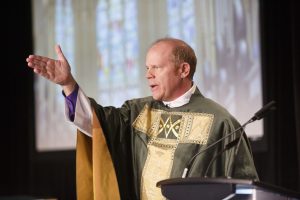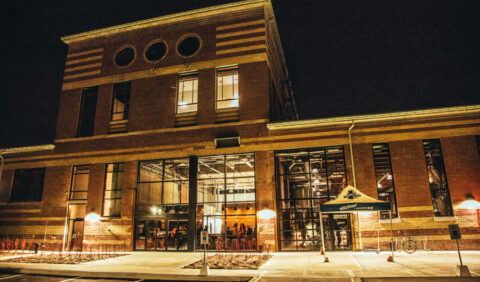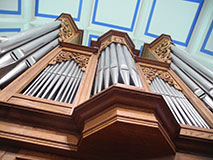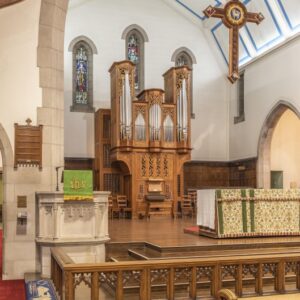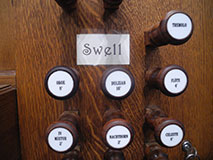Dear Friends in Christ,
It is our practice at Diocesan Council to have a moment at the beginning of each meeting to “Dwell in the Word.” A lay or clergy member offers a prayerful reflection to help guide our conversations and decision-making and to remind us of the context in which we live and move and have our being. Yesterday, Bishop Riscylla offered a powerful reminder to us of where we are dwelling now. I commend it to your reading. She said in part…
I saw a cartoon-style image circulating last week on Instagram and Facebook. The top third of the frame had a simple drawing of a church with a sign beside it that said, “Love thy neighbour.” The bottom two-thirds of the frame, beneath the surface of the ground, was filled with human skulls. Some depictions of the image have the skulls overlayed with words: 215 children – Kamloops, BC; 104 children – Brandon, Manitoba; 35 children – Lestock, Saskatchewan; 38 children – Regina, Saskatchewan; #392 & rising…
Who do you say I am? Jesus asks his disciples one of the most enduring questions of Christian life, in terms of the faith of individuals and the character of denominations. And who do we say we are, in relation to our faith, our Church, and that image from social media? Who do I say I am when I reflect on the teaching from Micah 6.8: to do justice, love kindness and walk humbly with my God?
In the Anglican Church of Canada, responding to the TRC’s 94 Calls to Action, we are in a process of change – of deepening maturity, of growing up and out – in which we are working intentionally to build partnerships and to support and facilitate self-determination in the Indigenous Anglican Church.
“Let us cross over to the other side,” Jesus invites his disciples. A new time has arrived at our doorsteps, into which we must grow or decay: a time of reconciliation, of transformation, of questions and deep listening; a time to un-learn some of the things that have served us and made us rich at the expense of our souls, that have been established over many generations of colonial rule – for example, political and economic interests that have been defined as somehow naturally concurrent with the interests of God.
The gospels narrate a series of interactions that Jesus has with people – interactions that cross social, racial and gender borders, constantly reminding us that there is no center and margin, no “us and them” in the Jesus movement. That radical inclusion is the destination of Jesus’ ministry, the kin-dom, the beloved community. Interestingly, many of our texts, including in the Hebrew scriptures, narrate a series of outcast, often Gentile, boundary-crossing women who, unlike the disciples, do get it – the stories laud their faith.
Jesus is a border crosser! He meets people in their humanity, in their created-ness – created in the image of God. It is costly, this discipleship, living in the intersections of the boundaries and borders that both keep us and prevent us from being more fully human.
We are in a kairos time in which we can act with purpose and humble authenticity, to create a more just environment in our Church and in our land. Together we are all treaty people – Christian and non-Christian “other.” In Christ-like love and the beauty of community, we can walk the good road, learning to not be afraid to bring many cultures and traditions together.
The colonizers’ Jesus – white and culturally superior – is not the Gospel. Settler theology settled quickly into Christian exclusivism, to genocidal result. We have to change – to expand, to break boundaries like Jesus of Galilee did from the inside out – to become a worthy partner in these relationships. Our work is to focus on un-settling from the benefits of colonization. Our witness in the world is to speak our perspectives on justice, land return, shared revenue, the TRC’s 94 Calls to Action. May the settler Church be Idle No More – living up to the instructions of Creator: to do justice, love kindness and walk humbly.
I conclude with an example of Indigenous and Christian intersections: The Seven Sacred Teachings, how we understand the world and life together:
To cherish knowledge is to know Wisdom;
To know Love is to know peace;
To honour all of the Creation is to have Respect;
Bravery is to face the foe with integrity;
Honesty also means “righteousness”, be honest first with yourself – in word and action;
Humility is to know yourself as a sacred part of the Creation;
Truth is to know all of these things.
Yours in Christ,
The Rt. Rev. Andrew Asbil
Bishop of Toronto
